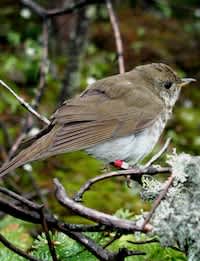Review will find if Rare Songbird Needs Endangered Species Act Protection
OutdoorHub 08.15.12

The Bicknell’s thrush, a songbird whose migration range stretches from the Caribbean to Canada, may need federal protection as a threatened or endangered species, the U.S. Fish and Wildlife Service announced today.
The announcement follows an initial review of a petition seeking to protect it under the Endangered Species Act. The Service based the decision, known as a 90-day finding, on scientific information about the Bicknell’s thrush provided in a 2010 petition from the Center for Biological Diversity and in the Service’s files.
The Service will start an extensive review for this songbird to determine if adding it to the federal list of threatened and endangered wildlife is warranted.
The Bicknell’s thrush has one of the most limited breeding and wintering ranges of any bird on the continent. It summers in scattered pockets across the northeastern U.S. and southeast Canada, requiring a very specific conifer forest habitat at the highest mountain elevations. Forestry, energy, and recreational developments, such as ski areas, threaten these special environments. During winter, the thrush migrates to the Dominican Republic, Haiti, Jamaica, Cuba, and Puerto Rico, where subsistence farming and logging threaten its forest habitat.
Like other migrating songbirds, the Bicknell’s thrush is further challenged by the impacts of changing climate on its breeding and wintering areas. The loss of high-elevation forests, shift in available food, and increase in extreme weather could affect the survival of this species. The Service, other management agencies and conservation organizations have focused on predicting and monitoring the effects of climate change, managing and protecting habitat, and restoring existing populations. This collaboration will be crucial to securing the long-term existence of this unique bird.
Today’s announcement begins a 60-day period during which the Service invites information on Bicknell’s thrush. In particular, the agency requests information about impacts to the species from climate change, operations of wind and telecommunication projects, and mercury accumulation. Following the review, the Service will issue a 12-month finding on the petition.
The 90-day finding can be accessed here on August 14, 2012, and at the Federal eRulemaking Portal starting August 15. Information may be submitted by one of the following methods:
- Federal eRulemaking Portal: http://www.regulations.gov. Follow the instructions for submitting comments to Docket No. FWS-R5-ES-0056.
- U.S. mail or hand-delivery: Public Comments Processing, Attn: Docket No. FWS-R5-ES-0056; Division of Policy and Directives Management; U.S. Fish and Wildlife Service; 4401 N. Fairfax Drive, MS 2042-PDM; Arlington, VA 22203.
Information must be received on or before October 15, 2012. The Service will post all comments on http://www.regulations.gov. This generally means the agency will post any personal information provided through the process. The Service is not able to accept email or faxes.
More resources:
- Bicknell’s thrush fact sheet (PDF)
- Specific information needs on Bicknell’s thrush (PDF)
- Bicknell’s thrush, climate change and range map (web article)

